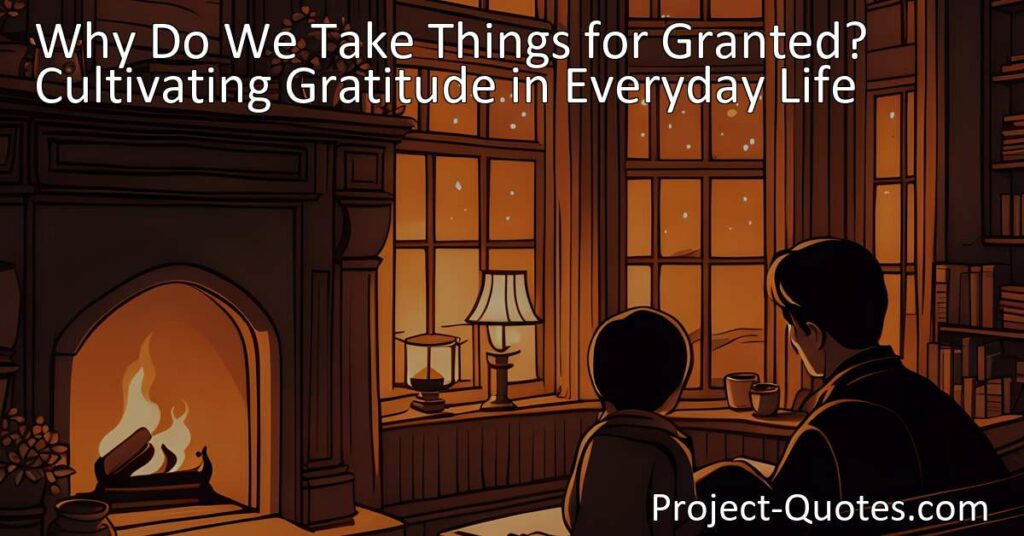It’s human nature to start taking things for granted again when danger isn’t banging loudly on the door.
David Hackworth
In the article titled “Why Do We Take Things for Granted? Cultivating Gratitude in Everyday Life”, it explores the human nature of taking things for granted and the importance of practicing gratitude in our daily lives. The article highlights how our desire for comfort and security can lead us to overlook the little things that truly matter. It also emphasizes the significance of appreciating relationships, good health, and the beauty of everyday life, both in times of hardship and tranquility. Through mindfulness and acts of gratitude, we can break free from this cycle and lead more fulfilling lives.
Table of Contents
Meaning of Quote – It’s human nature to start taking things for granted again when danger isn’t banging loudly on the door.
In our daily lives, it’s easy to get caught up in the hustle and bustle, taking things for granted without even realizing it. We often forget to appreciate the little things that make our lives so special when we’re not faced with imminent danger. As the quote suggests, it’s human nature to start taking things for granted again when danger isn’t banging loudly on the door. But why is that?
One reason could be our innate desire for comfort and security. When we feel safe and secure, we tend to relax and become less vigilant. We become complacent and lose sight of the things that truly matter. It’s during these times of tranquility that we’re most likely to take things for granted, be it our loved ones, our health, or even the world around us.
Imagine a beautiful sunny day with a gentle breeze caressing your face. You might take this pleasant weather for granted, assuming that it will always be there. But what if you found yourself stuck indoors for days on end due to a severe storm? Suddenly, that sunny day becomes a precious memory, and you realize how much you had taken it for granted. It’s often the absence of something that makes us appreciate its presence.
In relationships, too, this tendency to take things for granted can emerge. When a romantic relationship is new and exciting, we appreciate every little gesture and effort our partner makes. We cherish their presence and express gratitude for their love and support. However, as time goes on and the relationship settles into routine, some of that initial spark may fade. We begin to expect our partners to always be there, taking their love and devotion for granted.
Similarly, we can also take our friends and family members for granted. We get so used to their presence and support that we forget how lucky we are to have them in our lives. We might assume that they will always be there for us, without realizing that relationships need nurturing and appreciation to thrive.
At the same time, we can also take our own well-being for granted. When we’re healthy, we tend not to give much thought to our physical and mental well-being. We often take our ability to move, think, and feel for granted, only realizing their significance when faced with illness or injury. It’s in times of adversity that we appreciate good health and understand the value of self-care.
The quote also suggests that danger serves as a wake-up call, reminding us of the importance of gratitude. When we face difficult or life-threatening situations, our perspective shifts, and we begin to appreciate the things we once took for granted. This newfound awareness highlights the beauty and uniqueness of everyday life.
For instance, consider a natural disaster that devastates a community. People lose their homes, possessions, and sometimes even their loved ones. In the aftermath, survivors often express deep gratitude for the small blessings they once overlooked, such as clean water, a warm meal, or a safe place to sleep. This shared experience reminds us all of the importance of appreciating what we have and cherishing those closest to us.
However, it is important to note that we don’t have to wait for danger to come knocking in order to foster gratitude. We can actively cultivate gratitude in our lives by practicing mindfulness and appreciation on a daily basis. By consciously acknowledging the blessings that surround us, we become less likely to take them for granted.
One effective way to nurture gratitude is through the practice of keeping a gratitude journal. Each day, we can take a few moments to reflect on the things we are grateful for and jot them down. They can be as simple as a delicious meal, a kind gesture from a stranger, or a beautiful sunset. This exercise helps us focus on the positive aspects of our lives and cultivates an attitude of gratitude.
Additionally, taking time to express gratitude to the people we care about can strengthen our relationships and build a sense of mutual appreciation. Saying “thank you” or offering a small token of appreciation can go a long way in showing our loved ones that we value them and don’t take their presence for granted. Acts of kindness and gratitude create a positive cycle, fostering deeper connections and nurturing a sense of belonging.
In conclusion, it is indeed human nature to start taking things for granted again when danger isn’t banging loudly on the door. However, by recognizing this tendency and actively practicing gratitude, we can break free from this cycle. By appreciating and cherishing the everyday blessings in our lives, we can cultivate a sense of contentment and lead richer, more fulfilling lives. Let us remember to be grateful not only during times of hardship but also during moments of calm and tranquility.
I hope this quote inspired image brings you hope and peace. Share it with someone who needs it today!


